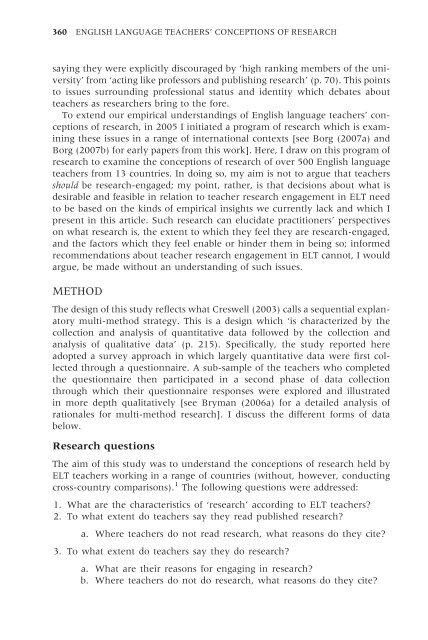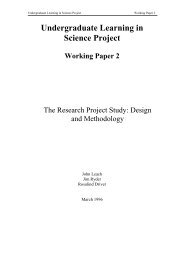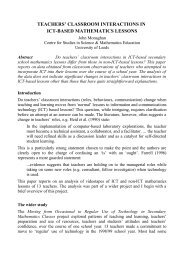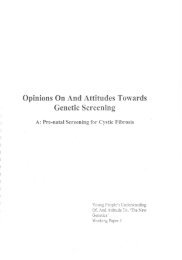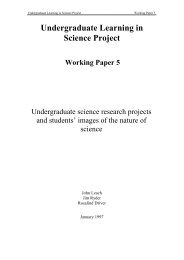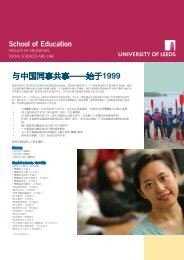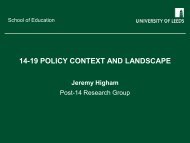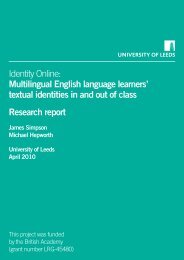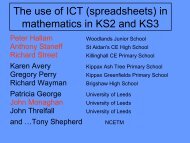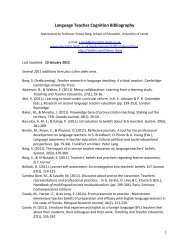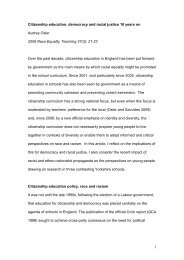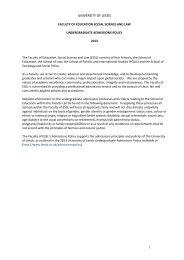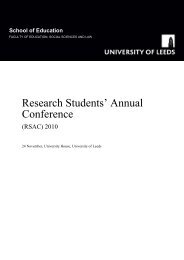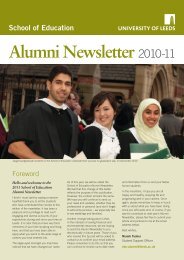English Language Teachers' Conceptions of Research - School of ...
English Language Teachers' Conceptions of Research - School of ...
English Language Teachers' Conceptions of Research - School of ...
Create successful ePaper yourself
Turn your PDF publications into a flip-book with our unique Google optimized e-Paper software.
360 ENGLISH LANGUAGE TEACHERS’ CONCEPTIONS OF RESEARCHsaying they were explicitly discouraged by ‘high ranking members <strong>of</strong> the university’from ‘acting like pr<strong>of</strong>essors and publishing research’ (p. 70). This pointsto issues surrounding pr<strong>of</strong>essional status and identity which debates aboutteachers as researchers bring to the fore.To extend our empirical understandings <strong>of</strong> <strong>English</strong> language teachers’ conceptions<strong>of</strong> research, in 2005 I initiated a program <strong>of</strong> research which is examiningthese issues in a range <strong>of</strong> international contexts [see Borg (2007a) andBorg (2007b) for early papers from this work]. Here, I draw on this program <strong>of</strong>research to examine the conceptions <strong>of</strong> research <strong>of</strong> over 500 <strong>English</strong> languageteachers from 13 countries. In doing so, my aim is not to argue that teachersshould be research-engaged; my point, rather, is that decisions about what isdesirable and feasible in relation to teacher research engagement in ELT needto be based on the kinds <strong>of</strong> empirical insights we currently lack and which Ipresent in this article. Such research can elucidate practitioners’ perspectiveson what research is, the extent to which they feel they are research-engaged,and the factors which they feel enable or hinder them in being so; informedrecommendations about teacher research engagement in ELT cannot, I wouldargue, be made without an understanding <strong>of</strong> such issues.METHODThe design <strong>of</strong> this study reflects what Creswell (2003) calls a sequential explanatorymulti-method strategy. This is a design which ‘is characterized by thecollection and analysis <strong>of</strong> quantitative data followed by the collection andanalysis <strong>of</strong> qualitative data’ (p. 215). Specifically, the study reported hereadopted a survey approach in which largely quantitative data were first collectedthrough a questionnaire. A sub-sample <strong>of</strong> the teachers who completedthe questionnaire then participated in a second phase <strong>of</strong> data collectionthrough which their questionnaire responses were explored and illustratedin more depth qualitatively [see Bryman (2006a) for a detailed analysis <strong>of</strong>rationales for multi-method research]. I discuss the different forms <strong>of</strong> databelow.<strong>Research</strong> questionsThe aim <strong>of</strong> this study was to understand the conceptions <strong>of</strong> research held byELT teachers working in a range <strong>of</strong> countries (without, however, conductingcross-country comparisons). 1 The following questions were addressed:1. What are the characteristics <strong>of</strong> ‘research’ according to ELT teachers?2. To what extent do teachers say they read published research?a. Where teachers do not read research, what reasons do they cite?3. To what extent do teachers say they do research?a. What are their reasons for engaging in research?b. Where teachers do not do research, what reasons do they cite?


